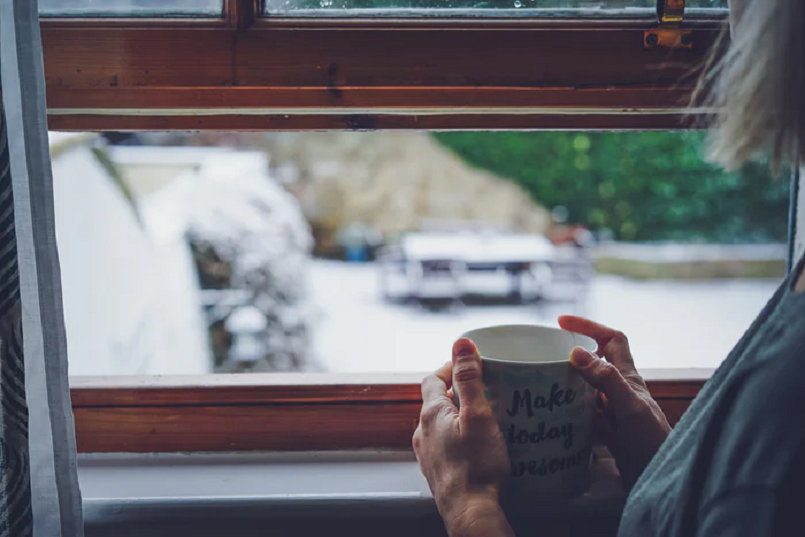An Ellen Notbohm interview with Jennifer McIlwee Myers
Jennifer McIlwee Myers is a treasure. The autism world’s self-titled Aspie-at-Large for the last fifteen years, Jenn’s unique voice, unmatched wit, and riveting insights into life as an autistic adult have captivated conference audiences and delighted readers of her two beloved books. I’ve been honored to call Jenn my friend for many years, and when I saw a short recent post of hers concerning social distancing, spiked with her usual waggish incisiveness, I knew she would have much more to say that would benefit so many of us in these extraordinary times. I was right.

Ellen Notbohm: “Social distancing” is a term most of us had never heard before Covid-19 spread to pandemic proportions. You recently posted:
Medical experts: It’s vital that you not touch other people, avoid crowds, and practice self-social isolation.
Autistics: We are way ahead of you!
Recognizing that autistics are not a monolithic block, what would you like non-autistic people to know or learn from those with autism and/or introverts in these extraordinary times of forced confinement? How are autistics “way ahead”?
Jennifer McIlwee Myers: As an introvert, I don’t cope with solitude, I crave it. My anxiety and depression have dropped to historically low levels as social distancing has become the rule. This even though I’m scared of what Covid-19 will do to humans. And even though I’m scared that disabled people will be triaged straight out of being alive. Concrete concerns about real threats can be acted on, and are less overwhelming than constantly monitoring myself and the world around me for social appropriateness, social signals, and the constant threat of ‘doing it wrong.’
My anxiety and depression have dropped because I’m not worried about the fact that social connectivity is literally the only safe alternative if you aren’t hella rich. I work at social connections because they are necessary for survival.
Say I had to go through chemotherapy and/or radiation therapy. Social connections are necessary if I need to be driven to my sessions, if I need a “meal train” to help me get adequate food, if I need people to run errands for me, etc. The amount of money I would need to be sure of providing these things for myself is significant.
Our society punishes people for their love of solitude. There is no worse “excuse” for refusing to join the group than the very real statement “I need time to myself.” No matter how stressful or painful being with a group may be, if you turn down enough invitations, you are labeled as anti-social and/or weird and/or a snob.
So now with social distancing, suddenly I don’t have to work my keister off to create a sufficient level of social connectivity to ensure that I am seen as human and worthy. Suddenly the constant mental whirl of trying to figure out how to continue connectivity adequately in a world that doesn’t naturally connect to me is quieted. Suddenly the pain stopped.
EN: The disability community largely rejects the term “normal” as being undefinable in any meaningful way. With the pandemic we now have the buzzphrase “the new normal.” How do you view this phrase? Do you see opportunity for consequential societal change in it?
JMM: Yes, the word “normal” often makes the disabled world break out in hives, and for good reason. Oh, the torture that word has been through in a society in which normalcy is prized—often by people who claim to be “free spirits” or who tell us verbally “children should be free to be themselves” while their actions say otherwise.
As for “the new normal,” I don’t know. Some of the people I care about most take the coronavirus much less seriously than I and my friends do; their normal is waaaay different than mine, a state of assuming this thing will blow over without danger to themselves. Their “normal” is still the way things used to be, and our current situation a wild anomaly. For me, I’m fully prepared for limiting my movements and washing my hands like Lady Macbeth on speed for as long as necessary. I’m also assuming that increased cleanliness and cleaning are going to stay with me, because who wants to get sick once they develop habits that will keep them well?
Disabled people are very used to limited socio-economic clout, especially with health care, so a lot of what’s happening is just their/our norm, but more intense. Can’t get things you need just to function? Can’t get medical care you need because your need doesn’t count right now? Can’t leave the house without risk and difficulty? Par for the course for a lot of disabled folks.
EN: You volunteered in the schools for many years. What perspective can you offer to parents who now find themselves home with autistic children whose vital routines have been upended?
JMM: That flexibility and the ability to leave previous goals behind are vital to teaching autistic kids. Deciding you’re going to cover X amount of ground each day or that a child has to do Y amount of work will make life hellish for all involved.
I remember observing in a class that included a boy whose mother had told his teachers that he had an asthma attack the night before and that he’d gotten very little sleep as a result. The kid was clearly wiped, but the head teacher was absolutely determined to put him through the paces. (This was the same teacher who couldn’t understand why a gifted autistic 3rd grader balked at doing the same social skills activities as the 1st graders.) The boy was not a “high profile” kid. He just had a teacher who was going to stick to the schedule no matter what. It was pretty gruesome. For the record, I did not whack her upside the head with a two-by-four. I have great self-restraint.
If you’re living with kids whose entire life, everyday schedules, routines, and rituals have been knocked into a cocked hat, it’s going to be difficult. Add in one or more adults who are in the same boat, and it gets even more chaotic. Getting through the day will always be an accomplishment.
Parents need to accept that they are just as valid as parents and human beings if all they do is get from one end of the day to the other without any 911 emergencies. That is the level to shoot for while gradually figuring out what academic stuff can be fitted into home life, or while finding ways for kids to get plenty of rhythmic movement in a small townhouse, and preventing the shaving of dogs, cats, relatives, siblings, etc.
Let the stressed-out kids stim, recite their fave TV shows/movies, and do the stuff autistics need to do to modulate their emotions as best they can. Rocking and flapping don’t guarantee calm, but it ratchets down the tension and give kids something to do that feels good without hurting anyone.
I’d also tell parents to hunt online for any SPIN-related information or support that they can share with their kid(s). Cast members of many popular shows have made encouraging videos, both in and out of character. Hugh Jackman (Wolverine) actually did a re-do of his hand-washing video after fans pointed out it was important not to leave the water running the whole time. And the team behind Shawn of the Dead did a video that’s a take-off of a very memorable scene from the movie. Doctor Who, the MCU, X-Men, Sesame Street—whatever turns a kid on is likely to have a corresponding message of hope, comfort, and/or handwashing instructions.
EN: Again acknowledging that autistic adults are not a monolithic block, in what ways do you think stay-at-home orders and social distancing might affect anxiety in autistic adults differently than children?
JMM: I think that circumstances would be a greater predictor of anxiety than age. For example, a child who is bullied badly at school and is therefore relieved to stay home may be far calmer than an adult whose weekly D&D club meetings are a treasured ritual and have also been cancelled. Other issues, like the availability of high-speed internet and the ability to buy needed groceries could also be more influential than age.
There are things I have found helpful for anxiety in general, for example, cleaning. In “normal” times, I find scrubbing the hell out of stuff combines sweat and a feeling of accomplishment. In the current situation, cleaning feels very purposeful, meaningful. Even little kids can have a spray bottle of water and wipe things down—and yes, those things will require a further cleaning from someone who hasn’t been handling their own boogers, but for heaven’s sake, get the kid doing something that feels like participating if at all possible. Older kids may complain about being handed Comet and a sponge, but if the whole family has assigned tasks and no one is singled out or left out, they join in making the house safer for themselves and everybody else.
Also important for anxiety: vigorous physical activity. I’m taking long walks every other day, with a thumping disco mix on my hilariously outdated iPod nano. Physically doing something seems to matter a great deal. Organizing toys, comic books, collectibles—this is the perfect time for lining up toy cars by color, manufacturer, and/or perceived value.
When I was kid and stuck with nothing to do, I’d resort to “room weaving.” That’s when you gather any odds and ends of string, yarn, and so forth from around the house, tie one end of a piece of furniture in your room, and then connect it to another piece of furniture, or a lamp, or whatever, and every time one string runs out you tie on the next piece and keep weaving back and forth until it looks like a drunken giant spider designed a Mission Impossible laser maze throughout the room. Then you spend some days getting through the room with great difficulty, working out paths from one place to another by bending, stretching, crawling, and limbo-ing through the web, until you get sick of it and re-wind up all the strings into their separate balls.
And I’d like to say this: if a kid can be kept calm and happy by the non-stop streaming of Wiggles concerts or panda videos or mummy documentaries—go for it! Did you know that the oldest known mummies in the world were found in modern-day Chile, made by the ancient Chinchorro people, and that their deliberately mummified bodies date back more than 2000 years farther than the oldest mummies in Egypt? I do, because YouTube!
EN: What else would you like us to know or ponder?
JMM: I only hope that when this is all over, the massive number of people who are struggling to get through “social distancing” will remember what it’s like to be denied the things that are necessary to their internal peace and well-being. I hope they can grasp that their pain in this moment is the pain every child who is told to “just ask if you can join the game” goes through when they are even denied the respite of just one recess alone on the swings. I hope this changes things just a little bit.
I hope that in all this devastation, people find their humanity and treasure and keep it. In a thousand ways, this is how we can get through this.
*

Ellen Notbohm is the author of the perennially beloved Ten Things Every Child with Autism Wishes You Knew and the blog The Next Thing You Know. Learn more about both, and about Ellen’s other award-winning books, on her website at https://ellennotbohm.com.

Jennifer McIlwee Myers is the author of How to Teach Life Skills to Kids with Autism or Asperger’s and Growing Up with Sensory Issues: Insider Tips from a Woman with Autism, and co-author of the groundbreaking Asperger’s and Girls.

Leave A Comment